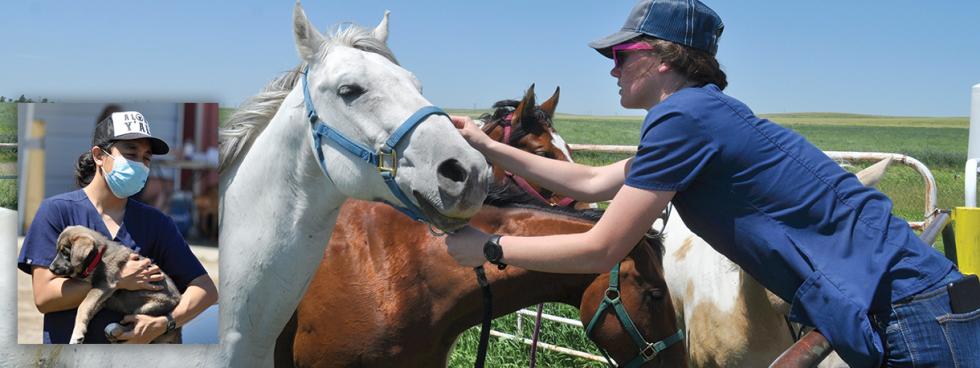
Three Days at Crow Creek
Every June, a large group of volunteers descend upon the Crow Creek Reservation in Fort Thompson, South Dakota.
For three days, College of Veterinary Medicine faculty, staff, students, alumni and other volunteers provide needed veterinary care to Tribal members’ dogs, cats and horses of the Crow Creek Nation. This past June, Iowa State volunteers were busy from dawn to dusk, providing spay, neuter, and preventive care for 447 animals.
“Every year we essentially put together a temporary small animal hospital and equine clinics,” said Dr. Joan Howard, clinical associate professor of veterinary clinical sciences. “We need to be prepared to care for the expected and the unexpected cases and developments.”
Planning is essential. Team members start meeting six months before traveling to the Crow Creek Reservation. Volunteers focus on assessing equipment needs, fundraising and seeking product donations, and coordinating with Tribal members.
In recent years, a two-week clinical rotation was added for CVM fourth-year students.
“We wanted students to have a fuller understanding of the community that we were working with, and we felt this would be a good opportunity for students to discuss and explore ways in which we can make veterinary medicine more equitable and inclusive,” Howard said.
The rotation also provides an opportunity for the students to refine their physical examination skills, understand equine and small animal preventive health care as well as honing their surgical skills.
It is also an opportunity to work in a diverse community.
“Engaging with the Tribal members as well as working with people from all over the country was really great,” said fourth-year student Caitlin Knutson. “The experience not only increased my confidence in performing various procedures, but also expanded my interpersonal skills.”
Students like Siyu Xiao worked with the Tribal members’ horses, including doing her first castration on her own at the Tribe’s rodeo grounds, where she and other volunteers worked outside, dealing with triple digit temperatures.
“One big thing I learned is how to provide health care under an environment with limited resources,” she said. “I used to think without large animal hospital equipment what can I do to provide health care, and everything needs to be built from zero.
“After this experience, I feel there is much that I can do to help owners and their horses.”
Back in town, the fire station has been transformed into a surgical unit for dogs and cats, which come and go throughout the day.
“When we would arrive in the morning, there was already a line of people at the door waiting for their appointment,” Knutson said. “It was a valuable experience to get to speak to Tribal members and good practice for me to explain the vaccines, dewormer, preventer care, and at-home care instructions.”
The operation resembles an assembly line. Owners check-in at an outside tent and filled out paperwork and then wait in their car or underneath a shade tree. Fourth-year students then greet the clients and their patients, taking a brief history before taking the animals inside the fire station for a physical exam.
After the physical exam, patients are either released back to their owners and moved into surgery for a spay or neuter. Most times, four different surgical tables were in use.
Elizabeth Elliott, one of those fourth-year students, spent all three days working at the small animal “hospital,” working in both the preventive care area and the surgical suite.
“I worked with more than 40 dogs and cats,” Elliott said. “This experience allowed me to improve my skills performing physical exams, giving vaccines, drawing blood and meeting with clients. On Sunday I performed a feline spay on my own in the morning and later monitored anesthesia while my student partner performed a canine spay.”
“Every day we were busy seeing patients, helping each other, and learning new things,” Knutson said. “I saw quite a few things I had only ever read about, so seeing how to address and treat those issues was really neat.”
While the experience at the Crow Creek Reservation is a one-time event for the students, traveling to South Dakota has become an annual event for Howard and many of the other volunteers.
“We have developed such a special relationship with Tribal members,” Howard said. “The clinics are a bit like a reunion as we meet up with Tribal members and their animals.”
July 2022
